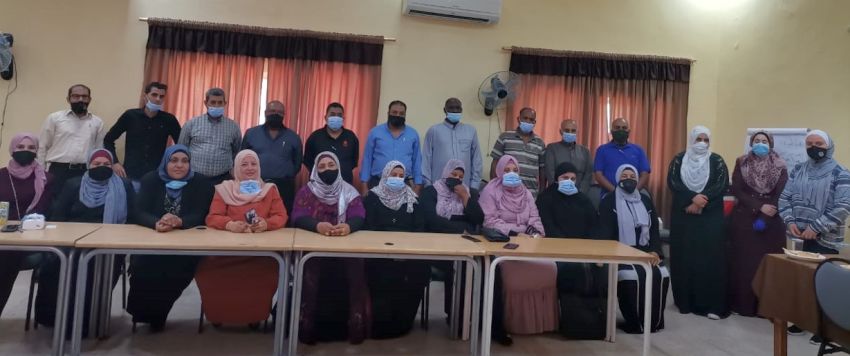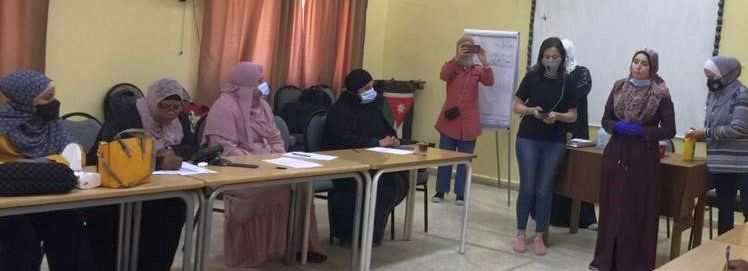Gender Reuse Interface from community perspectives A case of Irak Alamir and North Jordan Valley

Women and girls make up half of the targeted communities’ populations, yet the water reuse issue is often silent toward the gendered needs, interests, and roles in local communities in how it is planned, implemented, and managed. Female roles patterns are known to be different from men’s: women tend to have different gendered voices linked to reuse acceptance; make more tolerant to reuse non-conventional water resources more often than men; and frequently try to tackle water shortage as their reproductive role grow up their family agribusiness, while they perform their reproductive role.
During focus group discussions that was conducted by ReWater MENA project in collaboration with the Royal Scientific Society (RSS) in Jordan to draw upon farmers’ attitudes, perceptions, beliefs, experiences, and reactions regarding treated wastewater reuse from gender perspectives, women from Irak Alamir and North Jordan Valley; broke the shell and verified the statement that “women contribute” greatly in coping with scared water resources when they showed their welling to accept the idea of reallocating water resources by reuse treated wastewater in agriculture, to conserve freshwater even for other communities like the capital city of Amman, while men in the same communities consider the reuse approach is a form of systematic discrimination to marginalize them and for the benefit of the urban population. Men in our focus groups judge reuse acceptance as a mandatory governmental approach.
Therefore, the outcome is that men subconsciously chose to perform more resistance to reuse projects to protect their masculinity. Moreover, women evolved the treated wastewater issue from a purely technical discipline to multidiscipline, when they discussed technical aspects: treated wastewater quality, reuse techniques, dilution factors, related risks, and applications from socio-economic, political, and cultural perspectives. In this context, reuse dialogue revealed that women are key actors in an understanding of the existing gender dimensions concerning wastewater treatment for rural communities.
In North Jordan Valley, Women and men`s opinions, thoughts, knowledge, and practices toward reuse are acutely gendered; both women and men experience their gender identities differently by expressing their performance when they are discussing aspects linked to reuse, mainly agricultural practices. Participant women told us that they chose plant grapes because grapes trees can tolerate treated water and so they will be able to access more quantities of water for irrigation, men chose the source of water based on what they plant, for example, they grow citrus trees, and they irrigate them only with freshwater to protect the trees. Yet, women see that men have wrong irrigation practices when they reuse treated water. Women are also have emphasized that climate change impacts are obvious and have augmented during interludes of droughts, water scarcity. Natural catastrophe slays more women and men at the same time. Water shortage is no exclusion, political conflicts amplify water shortage, and the reuse then is a must as women in North Jordan Valley said.

During the water crisis, women raise in their fraction amid water resources vulnerability will also furnish more of their labor under unpaid circumstances and endure health complications for themselves and their families.
The ReWater MENA project endeavors to re-address women`s and men`s needs, interests, agencies, roles, and perspectives by redefining gender requirements in the reuse model in The Middle East and North Africa (MENA) countries. The Middle East and North Africa (MENA) region have been facing acute water shortage. It poses innumerable challenges for women and men to access affordable and safe water resources as well as safe sanitation and reuse mainly in a rapidly changing environment that causes great anxiety, Safe reuse models is a valued domain where gender silence could be unmuted by realistically considering the gender performativity and based on no-harm no-regret, unbiased principle, Consequently; this gendered safe reuse brings gender power to reshape it through public reuse discourse, which is redefined depending on the stressed daily life situations resulted due to water scarcity. It focuses on diverse facets that reflect the different roles and responsibilities of women and men as end-users. , sanitation, treatment, and reuse needs are all reshaped and add to women`s and men`s perspectives and experiences in terms of health, socio-economy, and wellbeing.
